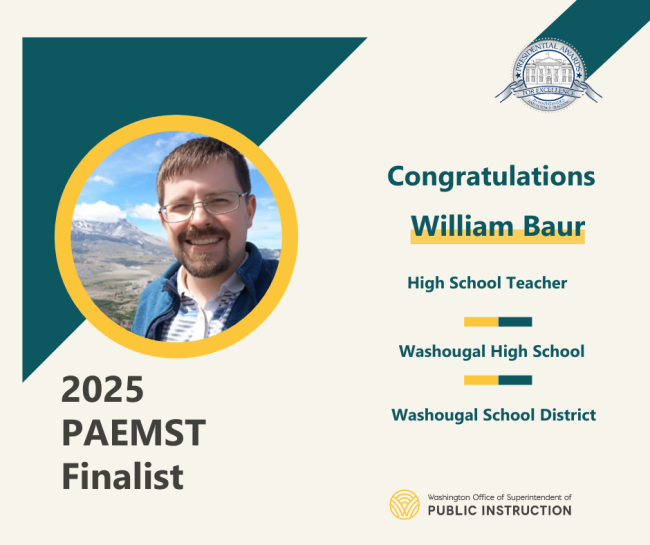William Baur
Media Contact
Katy Payne she/her
360-764-0201

What has been your personal journey on the way to excellence in teaching math/science?
My parents, grandparents, cousins, uncles, and aunts were my first science teachers and inspired my interest in the subject at a young age. As a first-year science teacher I was fortunate to be paired with an excellent mentor teacher: John Hoover. For six school years, we taught eighth grade together at Stewart Middle School in Tacoma. I learned from him the importance of bringing creativity, problem-solving, and real-world scenarios to science instruction. Collaborating with John Hoover helped build my confidence as a young teacher working under challenging circumstances. Since relocating to Clark County, my teaching journey has been shaped by my involvement in the OpenSciEd project as a field test teacher, professional learning facilitator, and curriculum writer. Through this project, I have been able to collaborate and learn with science educators from across the country.
What is one concept that excites your students and why?
This year for my HS biology class, I co-wrote and taught a unit about metabolism, carbohydrates, fats, and proteins centered around the question "How do we design a better school lunch to meet the nutritional needs of all students?" Throughout the unit, students learned about the nutritional needs of our body, feedback loops to maintain blood sugar levels, changing dietary guidelines and restrictions from the U.S. Department of Agriculture, and different types of fats and protein sources. At the end of the unit, the Washougal School District chef shared all the planning and work that goes into their daily school meals and my students got to ask him questions.
How do your lesson planning and teaching practices engage and support all students?
When selecting units to teach, I look for a phenomenon that is relevant to teenagers. The unit where students learn about Newton's Second Law is focused on explaining the phenomenon of car crashes becoming more common, but less deadly. The unit where students learn about electromagnetic waves is focused around how microwave ovens and cell phones work. This gives all students a starting place to engage in the topic. I start each unit by having students brainstorm questions they have about the topic, and then ideas they have for investigations and experiments.
How do the math and science concepts and skills you are teaching students help to prepare them for later learning, careers, and life?
I am teaching my students how to ask questions, collect and analyze data, and support their arguments with evidence. All these skills will prepare them for success. For each unit I teach, I recruit a local guest speaker from the school or community to share how their career relates to what we are learning in science class. Students also ask the guest speaker questions they brainstormed at the start of the unit. In the past few years, my class guest speakers have included breast cancer survivors, a healthcare navigator, a retired electrical engineer, the school cafeteria chef, and the CEO of the Port of Camas-Washougal.
What can math and science teachers do to make those disciplines more culturally sustaining for students with diverse identities and experiences?
I learn something new each time by listening to students sharing what they know. Or their questions make me motivated to learn more or bring in a guest speaker with a new perspective we hadn't considered before. When I field tested the cancer unit, my students learned why older people are at risk of cancer. However, they were curious about how a younger person could get cancer, but the experience of a young person diagnosed with cancer wasn't represented in the first draft of the curriculum. Later as a member of the cancer unit revision team at CU Boulder, I interviewed two young women, Lauren from Miami and Lakita from Kenya who have, a rare inherited genetic disorder that led them to have multiple bouts of cancer before they were teenagers. In the revised OpenSciEd HS biology cancer students watch interviews of Lauren and Lakita to learn how their cancer was treated, and how their family and loved ones supported them through their medical traumas.
What advice would you give to parents, families, or caregivers who want to support their students’ math and science learning?
Parents, families, and caregivers can support their students' learning in science by exploring the outdoors together. For HS age students, parents and guardians can encourage them to find a STEM related after school activity.





